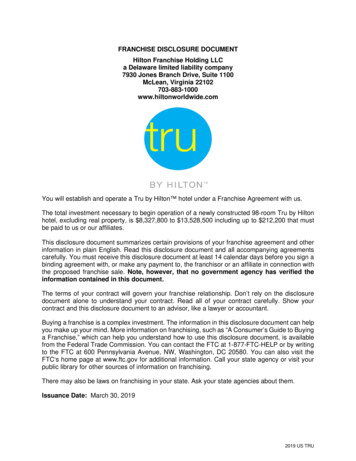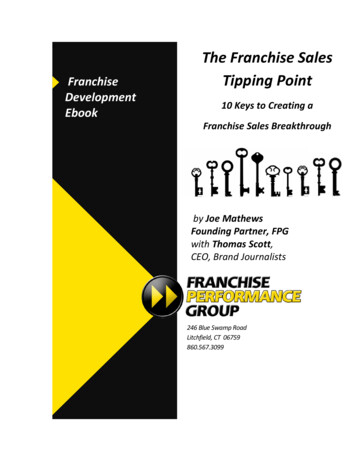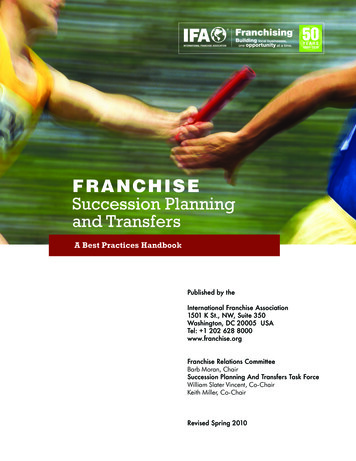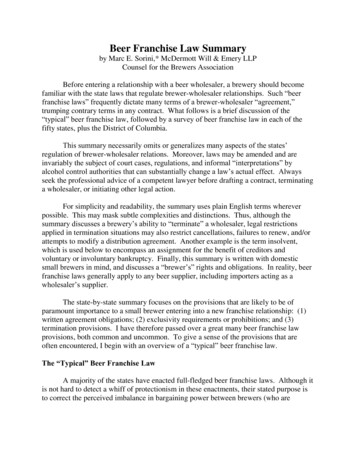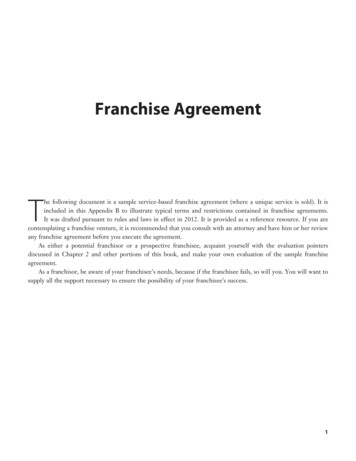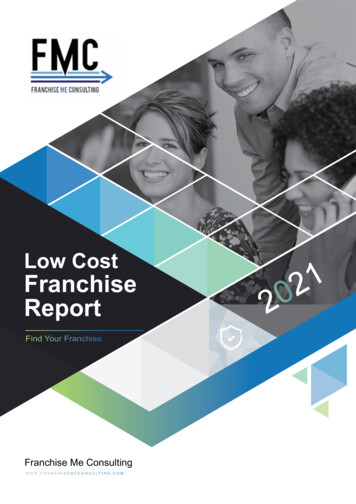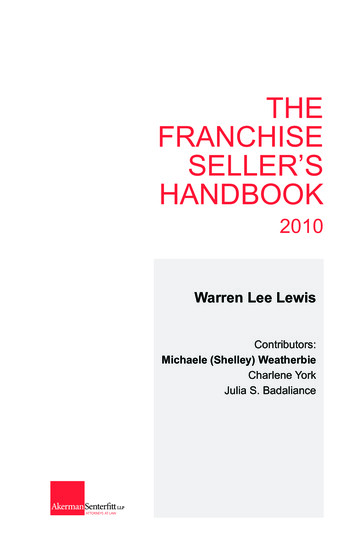
Transcription
THEFRANCHISESELLER’SHANDBOOK2010Warren Lee LewisContributors:Michaele (Shelley) WeatherbieCharlene YorkJulia S. Badaliance
THEFRANCHISESELLER’SHANDBOOK2010For Use in the U.S. and ItsTerritories Under The FTCFranchise Rule And StateFranchise Disclosure LawsWarren Lee LewisContributors:Michaele (Shelley) WeatherbieCharlene YorkJulia S. Badaliance
Copyright 2008-2010 Warren Lee Lewis. All rights reserved.No part of this handbook may be reproduced for a commercial purpose, in anyform or by any means, including, without limitation, electronic or mechanical, suchas photocopying or recording, or by any information storage or retrieval system,without the express written consent of Warren Lee Lewis, with the exception of quotations embodied in articles or reviews. No part of this handbook may be modifiedwithout the express written consent of Warren Lee Lewis.This handbook is a quick-reference tool for use in beginningto understand how to comply with federal and state laws thatregulate the offer and sale of franchises, and is not legaladvice. You should review actual current laws, regulationsand opinions, and should confer with experienced franchisecounsel, before making any decisions about your legalobligations or rights.If you would like additional information about the author, the contributors or theirlaw firm, Akerman, please: visit www.akerman.com; write to Warren Lee Lewisor Shelley Weatherbie at Akerman Senterfitt, 8100 Boone Boulevard, Suite 700,Vienna, Virginia 22182-2683; call Warren Lee Lewis or Shelley Weatherbie at703-761-2740 or 703-761-2745; or email warren.lewis@akerman.com orshelley.weatherbie@akerman.com.Registered trademarks of others used.Lewis, Warren Lee, 1945The Franchise Seller’s HandbookISBN [ ]1. Franchising. 2. Success in business. 2. Entrepreneurship.
Table of ContentsiTABLE OF CONTENTSINTRODUCTION:MAKING LEGAL FRANCHISE SALES1Chapter 1: Basic Franchise Sales StepsStep 1: Current FDD7Step 2: State Registration or Notice8Step 3: Notice of FDD Formats Available9Step 4: Notice of “Franchise Sellers” Involved11Step 5: Disclosure Whenever Requested By Prospect11Step 6: Minimum Disclosure Timing12Step 7: Receipts14Step 8: Providing Final Agreements to Prospect14Step 9: Re-Disclosure If “Material Change” Occurs15Step 10: Execution of Agreements16Step 11: Post-Sale Obligations17Chapter 2: Special Disclosure SituationsSituation 1: Transfer of Franchise19Situation 2: Renewal or Extension of Franchise20Situation 3: Modification of Franchise21Situation 4: Sale of Additional Franchise to Existing Franchisee21Situation 5: Sale of Operating Outlet22Situation 6: Written Substantiation of FPR23Situation 7: Supplemental FPR24Situation 8: New “Franchise Seller” After Disclosure24
iiThe Franchise Seller’s HandbookSituation 9: Exemption25Situation 10: Non-U.S. Outlet26Chapter 3: Permitted Franchise Sales ActivitiesPermitted 1: Advertising27Permitted 2: Communications Before and During Waiting Periods29Permitted 3: Confidentiality Agreement30Permitted 4: “Cost Information Alone” Outside FDD30Permitted 5: Discovery Day31Permitted 6: Negotiation32Permitted 7: Supplemental Material Information33Chapter 4: Prohibited Franchise Sales ActivitiesProhibited 1: Disclaimers or Waivers of Representations in FDD35Prohibited 2: FPRs Outside FDD35Prohibited 3: Information Contradictory to Information in FDD37Prohibited 4: Use of “Shills”37APPENDIX A: Regulatory Statesand Non-Regulatory Jurisdictions39APPENDIX B: Glossary41ABOUT THE AUTHOR AND CONTRIBUTORS47ABOUT AKERMAN49CONTACT US; USE; DISCLAIMER50
Introduction: Making Legal Franchise SalesINTRODUCTION:MAKING LEGAL FRANCHISE SALESA Franchise SellerIf you are an officer, employee, representative or broker involvedin the offer or sale of franchises, you are a “franchise seller.” As afranchise seller, you can use this handbook to help you make legalfranchise sales.Your involvement in the offer or sale of franchises may beobvious, such as if you are a salesperson actively pursuing franchiseeprospects for a franchisor, are signing agreements with newfranchisees, or are accepting payments from new franchisees.Or, your involvement may be less obvious, such as if you areparticipating as a finder or consultant in discussions with prospectsabout their business interests, pre-screening prospects throughquestionnaires, recommending franchise options, or assistingprospects in completing franchise application forms. In eithercase, you are involved in the offer and sale of franchises, makingyou a franchise seller.Your Obligations as a Franchise SellerAs a franchise seller, you must comply with the FTC franchise rule andnumerous state laws that regulate the offer and sale of franchises.The FTC franchise rule requires a franchisor to prepare a FranchiseDisclosure Document, known as an FDD; to keep the FDDupdated as “material changes” occur, new audited financialsare issued and new fiscal years phase in; to follow and have itsfranchise sellers follow basic franchise sales steps in dealingswith prospects; and to modify the basic franchise sales steps in certain special situations.In addition, the FTC franchise rule permits and prohibitsspecific activities during the franchise sales process. TheFTC franchise rule does not require a franchisor’s FDD to befiled with the FTC, but it does permit the FTC to investigate1
2The Franchise Seller’s Handbookand punish franchisors and franchise sellers believed to haveviolated the rule.About half of the states have laws that may require a franchisorto register its FDD or file a notice with the state before offering orselling a franchise that has some connection to the state (seeAppendix A). The triggering connection may be based on theresidency of the prospect, the location of the franchised business,or the occurrence of communications within, into or out of thestate. Several state laws require a franchisor and its franchisesellers to follow special disclosure timing rules (see Appendix A).Those laws may change, so you should check with the franchisor’slawyer or compliance manager about when any changes might takeeffect.Penalties for Not Meeting Your ObligationsIf you do not meet your obligations under the FTC franchise rule andstate franchise disclosure laws (“state laws”), you and the franchisoryou represent could suffer significant penalties.The most frequent penalty is a claim or lawsuit by a franchisee whichis costly to defend, and which results in a settlement or judgmentrequiring the franchisor to rescind or void the franchise agreement,refund the franchisee’s payments, or reimburse the franchisee’s damages, attorney’s fees and costs. This penalty can be financially debilitating or devastating.Another common penalty is the loss of your job or relationship with afranchisor.The states often seek penalties, including: orders which must bedisclosed to prospects for 10 years or longer; monetary paymentsto franchisees or the states; or restrictions on your future businessactivities.In some instances, a penalty may be an FTC investigation that resultsin an order which you must disclose to future prospects, a freeze ofyour assets, civil penalties of up to 10,000 per violation, paymentsto franchisees, or an injunction.
Introduction: Making Legal Franchise SalesIn rare instances, a penalty may be a state criminal prosecutionagainst you.Hopefully, your desire to make legal franchise sales and this array ofpossible penalties will motivate you to make a serious effort to meetyour legal obligations during the franchise sales process.What to Do When You Make a MistakeAll franchise sellers make mistakes at times when trying to complywith the FTC franchise rule and state laws, because so many technical requirements are involved. This means that you will make mistakes.When you make a mistake, you will have two choices. Keep it toyourself, or tell the franchisor’s lawyer or compliance manager aboutit. If you keep it to yourself, you may think it will go away and neverhurt or be discovered by anyone, but you may be missing an opportunity to cure the mistake or minimize its potential damage. You alsomay be violating a policy of disclosure adopted by the franchisor yourepresent. On the other hand, if you tell the franchisor’s lawyer orcompliance manager about the mistake, you and the franchisor yourepresent will be able to decide, jointly and with full knowledge of alloptions, on the best way to deal with the mistake.How to Use this HandbookThis handbook supplements, but does not substitute for, the legal andbusiness advice that you need on an ongoing basis from the franchisor’s lawyer, compliance manager and franchisor executives abouthow to comply with the FTC franchise rule and state laws. Laws,regulations and interpretations change, the facts in each situation areunique, and different franchisors have different policies and legal risktolerances, so you should not rely on this handbook alone to makea final decision about how to act during the franchise sales process.You should use this handbook to inform and remindyourself about the key issues affecting franchise sellers. Chapter 1describes the 11 basic franchise sales steps that you must know (seeDiagram 1). Chapter 2 describes 10 special situations that couldmodify the basic franchise sales steps (see Diagram 1). Chapter 33
4The Franchise Seller’s Handbookdescribes activities that are permitted during the franchise salesprocess. Chapter 4 describes activities that are prohibited during the franchise sales process. Appendix A is a list of states withregistration, notice and special disclosure timing requirementsthat may affect you. Appendix B is a glossary of some commonfranchise sales terms that you must understand.Good luck, and enjoy offering and selling franchises with a clearunderstanding of your legal obligations, and with confidence that youare making legal franchise sales.
-SaleSupplemental FPRSpecial DisclosureSituationsRenewalN ew Sellers fe r11nTrataRe-disclose9lbsnauFPR SAd d i t i oNoticeFilingsBasic Franchise Sales StepstletOuStartOfferingFranchise1nting O utlettioFDDeraiaNo n - U.S.Opnt47 Days8Sellers5714 DaysReceipt6On RequestSMTHE Franchise Sales PROCESSIntroduction: Making Legal Franchise Sales5Diagram 1. The Franchise Sales Process
6NotesThe Franchise Seller’s Handbook
Chapter 1: Basic Franchise Sales StepsCHAPTER 1: BASIC FRANCHISESALES STEPSIf you want to make a legal franchise sale, you must follow certainbasic franchise sales steps. Those steps are described below.The steps apply if you are offering or selling a franchise to a newfranchisee for a new outlet, if the outlet will be located in the United States, if you will be offering or selling franchises in one or morestates with franchise disclosure laws, and if you are not exempt fromfollowing the steps under the FTC franchise rule and state law. In thespecial situations discussed later in this handbook, the steps may apply, may not apply, or may be modified.Step 1: Current FDDYou must have a current Franchise Disclosure Document (FDD). Itmust be in the format specified under the FTC franchise rule andstate laws.The FDD may be paper or electronic. In either case, it must be a“single document.” In other words, for example, the franchise agreement and the franchisor’s financials must be integrated into the FDD,and may not be free-standing. If the FDD is electronic, it may containscroll bars, search features, internal links and limited external links,but it must not contain multi-media features such as audio, video,animation, pop-up screens or other external links.The FDD must be current. This generally means that it must havebeen updated within 120 days after the franchisor’s most recent fiscalyear end, and, in addition, must have been updated promptly afterthe occurrence of any “material change” (anything such as a lawsuit,bankruptcy, fee increase, cost increase, financial reversal, or otherchange that might be significant to a prospect). So, if the franchisorhas a fiscal year ending December 31, the FDD must be updated nolater than April 30 (120 days after December 31). If it is not, you mustnot offer or sell the franchise. Similarly, if the franchisor was sued bya franchisee under a state law or increased its initial franchise fee inAugust, and you are about to disclose a prospect in September, the7
8The Franchise Seller’s HandbookFDD must have been updated to disclose the lawsuit or increasedfee. If it was not, you must not offer or sell the franchise. You shouldcheck with the franchisor’s lawyer or compliance manager before using any FDD that might be outdated.There may be times, in a franchise registration state, when you canuse an FDD that has not been updated within 120 days after thefranchisor’s most recent fiscal year end – if the FDD is registered withthe state and the registration is effective longer than 120 days afterthe fiscal year end. There also may be instances when you can usean FDD that has not been updated after a “material change” has occurred – such as when only the more lenient updating requirementsin the FTC franchise rule apply. In determining whether the FDD iscurrent, you must be particularly careful during any period that thefranchisor’s FDD must be updated or amended because of a “material change.” If you want to disclose a prospect during that period, insome instances you may be permitted to use the previous FDD, butin other instances, you may not. Even if you are permitted to use theprevious FDD, you may be required to re-disclose the prospect withthe updated FDD before you sell a franchise. Always check with thefranchisor’s lawyer or compliance manager before proceeding in thistype of situation.Step 2: State Registration or NoticeIn order to offer or sell franchises in certain states with franchise disclosure laws (see Appendix A), the franchisor must have effectiveregistrations or notices in those states.A state law may cover the offer or sale of a franchise if the prospectresides in the state, if the franchised business will be fully or partiallyoperated in the state, or if any communications about the franchiseoffer or sale are made in, into or from the state. State laws vary interms of when they apply, so if any state listed in Appendix A is involved in any manner, you should check with the franchisor’s lawyeror compliance manager about whether that state’s law applies. If thelaw applies and the franchisor does not have an effective registrationor notice, you may be prohibited from offering or selling the franchiseuntil after the franchisor obtains a registration or files a notice.
Chapter 1: Basic Franchise Sales StepsIf the franchisor is registered with a state, the state and the effectivedate of the registration should be noted at the bottom of, or immediately after, the state cover page in the FDD. No effective date fora state with a state law likely means that the franchisor will need toobtain a registration from that state before you make an offer or salecovered by the law. An old effective date likely means that the franchisor’s FDD or registration will need to be updated before you makean offer or sale covered by the law. If you have any question abouta state, check with the franchisor’s lawyer or compliance manager.No effective date, or an effective date that is not within the previous 12-month period, for a notice state such as Florida, Indiana,Kentucky, Michigan, Nebraska, Texas or Utah, may not be a problem (see Appendix A), since effective dates for those states are notrequired to be in the FDD, and since some of those states permitnotices to remain effective indefinitely unless specific changes occur,such as address changes.State laws require registered FDDs to be updated annually, or immediately, promptly or within a reasonable time after “material changes”occur. See the discussion about this issue under “Step 1: CurrentFDD” above.Step 3: Notice of FDD Formats AvailableBefore furnishing an FDD to a prospect, you must confirm that theprospect has been given, or must give the prospect, notice of theFDD formats available, and the prerequisites and conditions for obtaining those formats.The law does not require the notice to be in writing or to be acknowledged. The notice may be given personally, by telephone or in writingby paper or electronically. However, as a matter of policy, a franchisormay require the notice to be in writing, and may require the prospectto sign or initial an acknowledgment of the notice. This type of policyprotects the franchisor and you from later claims by prospects thatthey were not given the notice.The notice must be given to a prospect before an FDD is furnished tothe prospect. If the notice is posted on the franchisor’s website or included in the franchisor’s marketing materials or franchise application9
10The Franchise Seller’s Handbookform, and if the prospect has visited the website, received the marketing materials or submitted an application form, the prospect has beengiven notice. However, you should not assume this to be the case.You should confirm that the prospect has been given notice, or youshould give the prospect notice, before you furnish an FDD to theprospect. You should be particularly careful if you are dealing with aprospect who meets you at a trade show, a renewing franchisee, acurrent franchisee buying an additional franchise, or a transferee of acurrent franchisee. These types of prospects are least likely to havebeen given the notice.The notice must be given whether the franchisor uses just paperFDDs, just electronic FDDs, or both paper and electronic FDDs. Thespecific wording of the notice is not prescribed by law.If a franchisor uses both paper and electronic FDDs, the notice couldstate:Notice of Available Disclosure FormatsIf you qualify as a franchisee prospect, we will furnish you with ourfranchise disclosure document in paper form unless you request anelectronic copy by sending an email request to [name, title] at [email@franchisor]. We will provide the paper form of our franchise disclosure document to you in person if you visit our offices, or we willmail or courier the document to you at our cost. We will provide theelectronic form of our franchise disclosure document to you in PDFformat, sent by email to the address you provide to us. You will needto have Adobe Reader software installed on your computer to openand view the PDF document and a printer to print at least one Receiptpage.If a franchisor uses just paper FDDs, the notice could state:Notice of Available Disclosure FormatsIf you qualify as a franchisee prospect, we will furnish you with ourfranchise disclosure document in paper form. We will provide thedocument to you in person if you visit our office, or we will mail orcourier the document to you at our cost.
Chapter 1: Basic Franchise Sales StepsStep 4: Notice of “Franchise Sellers” InvolvedBefore furnishing an FDD to a prospect, you must confirm that bothreceipts at the end of the FDD identify all “franchise sellers” who havebeen or will be involved in offering the franchise to the prospect. Thereceipts must state the franchise sellers’ names, business addressesand business telephone numbers. Or, the receipts may refer to anexhibit containing the franchise sellers’ names and contact information.The meaning of the term “franchise sellers” is narrow for this purpose.The FTC wants the receipts to identify the persons who have beenor will be dealing directly with the prospect, including key officers oremployees and any broker. The FTC does not want the receipts toidentify all persons who arguably might be franchise sellers in a broadsense, or to cross-reference lists of brokers or other persons whomight sometimes represent the franchisor. A few key persons whoare involved in all or most franchise offers and sales for the franchisor may be pre-identified on all receipts. Other persons, such asbrokers who deal occasionally with the franchisor’s prospects, mustbe identified in typing or handwriting on the receipts, on a prospectby-prospect basis. Any person who will receive a sales commissionor quota credit if a franchise is sold to the prospect must be identified.See the discussion in the section below on “Situation 8: New‘Franchise Seller’ After Disclosure” concerning what must be done ifa franchise seller not identified on the receipts becomes involved withthe prospect after disclosure has occurred.Step 5: Disclosure Whenever Requested By ProspectThe franchisor must furnish its FDD to a prospect whenever the prospect reasonably requests it. If you merely represent the franchisorand do not handle disclosure directly, you must communicate the request to the franchisor. The franchisor then must fulfill the request.A request from a person who has not yet qualified and been acceptedas a prospect does not trigger this step. Only a request from a bonafide prospect triggers it.11
12The Franchise Seller’s HandbookThe purpose of the step is to permit the prospect to obtain and reviewthe FDD before incurring significant costs to investigate the franchiseor travel to the franchisor’s office. Therefore, the franchisor may notrefuse to furnish the FDD until, for example, the prospect attendsdiscovery day.The FTC franchise rule does not require a request to be in writing, and does not say how quickly an FDD must be furnished afterit is requested. Presumably, most prospects will make requests bytelephone or in emails. You and the franchisor must establish andmaintain a system for recording and responding promptly to theserequests. The FTC franchise rule assumes a prompt response, butpermits some flexibility based on extenuating circumstances such asa poorly timed request (for example, a request made late on Fridayafternoon) or a request made when the FDD is being updated. If arequest is made when the FDD is being updated because of a “material change” (see “Step 9: Re-Disclosure If ‘Material Change’ Occurs”below), you or the franchisor may respond that the FDD is being updated and will be furnished after it is updated or registered.The FTC franchise rule permits you to furnish the FDD directly to theprospect or to a representative of the prospect, such as a partner,owner, officer, employee, agent, lawyer or accountant. Some statesmay not permit you to accomplish disclosure by merely furnishingthe FDD to a representative. Check with the franchisor’s lawyer orcompliance manager.You are not required to furnish an FDD in the particular format requested by a prospect. However, if the prospect refuses to acceptdelivery of an FDD because of its format, you may not make a franchise offer or sale to that prospect.Neither you nor the franchisor may charge any fee in connection witha prospect’s right to receive an FDD whenever he or she reasonablyrequests it.Step 6: Minimum Disclosure TimingYou must disclose a prospect with the franchisor’s FDD a minimumamount of time before the prospect signs any binding agreementwith, or pays any amount to, the franchisor or any affiliate.
Chapter 1: Basic Franchise Sales StepsIf you are using a paper FDD or an FDD on a CD, disclosure occurson the day you hand-deliver or otherwise actually deliver the FDD tothe prospect, or 3 days after you mail the FDD to the prospect by firstclass mail. If you are disclosing electronically, disclosure occurs onthe day you email the FDD to the prospect, or give the prospect directions for accessing the FDD on the Internet. The date on the signedand dated receipt received from the prospect for the FDD (see Step 7below) should correspond to the date disclosure occurs.In most states, the minimum disclosure time is 14 calendar days before the prospect signs or pays. When counting calendar days, youmay not count the day the FDD is delivered or the day the prospectsigns or pays.Some state laws require different minimum disclosure times (seeAppendix A). If the Iowa, Maine, Maryland, Nebraska, New York,Oklahoma or Rhode Island law applies, you may be required to disclose the prospect at your first “personal meeting” with the prospect.A “personal meeting” is a face-to-face meeting in a semi-private settingsuch as a restaurant or a lounge area at a tradeshow, or in a privatesetting such as a hotel conference room or your office. If the Connecticut, Maryland, Michigan, New York, Oklahoma, Rhode Island,Texas, Utah or Washington law applies, or if you are exempt as alarge franchisor in California, you may be required to disclose theprospect at least 10 business days before the prospect signs or pays.When counting business days, you may not count the day the FDD isdelivered, the day the prospect signs or pays, Saturdays, Sundays, ormost federal or state holidays.Some of the state laws requiring different minimum disclosure timesmay be changed, so you should check with the franchisor’s lawyeror compliance manager about when any changes might take effect.Until all of the state laws are changed, however, your franchisor mayrequire you to disclose all prospects at their first personal meetingsand at least 10 business days before they sign or pay, just to be safein case any of the laws apply.13
14The Franchise Seller’s HandbookStep 7: ReceiptsThe franchisor’s FDD should contain two last pages that are nearlyidentical receipts.After you furnish the FDD to a prospect, you must obtain from theprospect the receipt indicated to be for the franchisor, after it hasbeen dated and signed by the prospect. The date must be the dayof disclosure, not an earlier or later date. You may help the prospectto identify or remember the day of disclosure, but the prospect, notyou, must date and sign the receipt. It is best to obtain a manuallysigned and dated original of the receipt, but it is acceptable to obtaina faxed or emailed copy of a signed and dated receipt, or a receiptthat is electronically signed and dated. The receipt may be returnedby a means different from the means used to furnish the FDD to theprospect.Under the FTC franchise rule, a prospect’s signature may be handwritten, or may be a security code, password, electronic signature orother device authenticating the prospect’s identity. The franchisor,however, may have a policy of only accepting handwritten signatures.Check with the franchisor’s lawyer or compliance manager.If you are using an electronic FDD, the receipts must be containedwithin the FDD. The prospect must be required to open the entireFDD in order to locate and print the receipts.You should encourage the prospect to date, sign and keep the otherreceipt indicated to be for the prospect.Step 8: Providing Final Agreements to ProspectThe franchisor or you will be preparing and providing to the prospectthe final agreements to be executed by the parties.If the final agreements differ from those in the FDD only to the extent of “fill-in-the-blank provisions” (see definition in Appendix B) orchanges made in response to negotiations initiated by the prospect,then you are not required to observe a waiting period before havingthe prospect sign the agreements, assuming that the minimum disclosure period for the FDD has expired.
Chapter 1: Basic Franchise Sales StepsIf the final agreements differ from those in the FDD in other ways,you must observe a 7-calendar-day waiting period before having theprospect sign the agreements. The types of changes that trigger a7-calendar-day waiting period include, for example, specifying thegeographic scope of a protected territory that was not specified inthe FDD, specifying the initial franchise fee if it can vary, specifyingsales quotas or interest rates if they can vary, specifying the numberof outlets to be opened under an area development agreement, orchanging any terms in the agreements unilaterally. When providingfinal agreements with these types of changes, you must highlight thechanges to the prospect in some manner, such as a cover letter orblack-lined document. When counting calendar days, you may notcount the “action days”---the day the final agreements are deliveredor the day the prospect signs them. If the prospect negotiates additional changes during the waiting period, you are not required tore-start the waiting period.As a matter of policy, the franchisor may require you to obtain a datedand signed receipt for the final agreements from each prospect andto observe 7-business-day waiting period with every prospect. Checkwith the franchisor’s lawyer or compliance manager.You may provide the final agreements on the same day that you furnish the FDD, or you may provide the final agreements at a later time.If you provide the final agreements when or shortly after you furnishthe FDD, the 7-calendar-day waiting period for the final agreementsruns concurrently with the 14-calendar-day minimum disclosure period or any 10-business-day minimum disclosure period.Step 9: Re-Disclosure If “Material Change” OccursIf a “material change” occurs at any time after you furnish a prospectwith the franchisor’s FDD, the franchisor must update the FDD, andyou must re-disclose the prospect with the updated FDD and re-observe all waiting periods.A “material change” may be voluntary or involuntary.Voluntary “material changes” include, for example, changes to anyfee, the size of territories, territorial rights, any substantive term inany agreement in the FDD, the products or services offered by fran-15
16The Franchise Seller’s Handbookchisees, the initial investment required or the franchisor’s name, andmay include changes to the franchisor’s leadership team. A lawsuitfiled by the franchisor against a franchisee generally is not a material change that requires immediate updating and re-disclosure, eventhough the franchisor must disclose the lawsuit when it does its annual FDD update.Involuntary “material changes” generally are negative, and include,for example, a significant legal proceeding brought against the franchisor or an
Step 11: Post-Sale Obligations 17 Chapter 2: Special Disclosure Situations Situation 1: Transfer of Franchise 19 Situation 2: Renewal or Extension of Franchise 20 Situation 3: Modification of Franchise 21 Situation 4: Sale of Additional Franchise to Existing Franchisee 21 Situation 5: Sale of Operating Outlet 22



